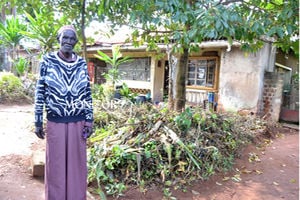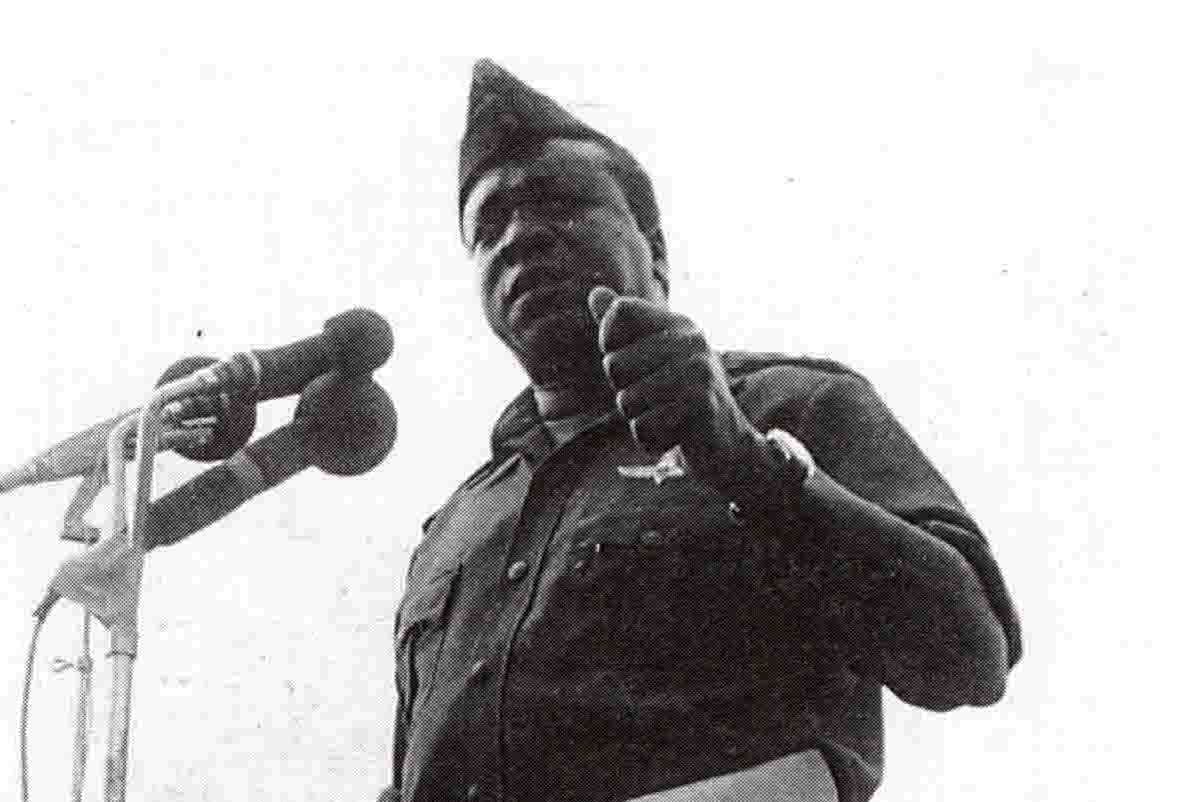
Mr Franco Munyakazi during the interview at his former workplace at Ndejje SS, Luweero District last week. PHOTO | DAN WANDERA
Franco Munyakazi, 71, has called time on his duty of service as a watchman at Ndejje Secondary School after holding the job for an eye-watering 55 years.
When a friend seconded him for the position in 1969, Munyakazi was not a trained security officer. He learnt on the job the difficult, if not arduous, art of keeping a sharp eye on both the students and the school property.
Munyakazi was recruited at the age 16 by somebody who saw him working at a nearby farm and admired his character as a young man who could possibly help at the school as a guard. His loyalty to the job prescription as a gateman in his early years at Ndejje SS in Luweero District made him a darling of both the school administration, staff and students.
In 1972, President Idi Amin made an abrupt visit to Ndejje SS. Unbeknown to Munyakazi that the occupant of the car at the gate was of the country’s head of state, he demanded that Amin sign the visitors’ book before being let into the school’s premises.
“While I was misjudged by onlookers for my insensitivity when I presented the visitor’s book for the President to sign, Amin himself was very happy that I was a true guard man. He pulled Shs300 out of his pocket and gave it to me,” Munyakazi recalls, adding: “His soldiers were annoyed but Amin thanked me for a great job as a gate guard man. Speaking in Kiswahili, Amin told me: ‘you know your work’.”
Munyakazi was warned by some people that the possibility of Amin’s soldiers returning in the cover of the darkness to “teach me about protocol” was high. This, mercifully, did not happen. The Shs300 tip from Amin was more than double the salary he was getting.
All this happened when Ndejje SS was headed by Mr George Varughese. The Indian national, a strict disciplinarian, ran the rule over Ndejje SS between 1970 and 1973. Because the visit was abrupt, the President spent less than 20 minutes and never actually toured the school. The purpose of the visit and what was discussed with the school administrators was never publicised.
“We were only informed that the visit was part of the presidential whistle-stop tours of public facilities. But the likelihood that Amin always visited Bombo Town and Bombo Barracks located about 10kms away from Ndejje possibly explains the abrupt visit,” Munyakazi tells Sunday Monitor.
War breaks out
The Greater Luweero area (triangle) suffered the devastating effects of the early 1980s war between the then government forces and the guerrilla forces led by Mr Yoweri Museveni. While the most devastating period was the war fought between 1984 and 1985 where the school compound became a command centre and later a battleground, Ndejje SS had earlier in 1979, during the overthrow of President Amin, suffered a setback. The fleeing soldiers are reported to have attacked the school and counted among their plunder a newly acquired school bus.
“The students scattered and many walked on foot to their respective homes. Fortunately, no life was lost in 1979 at the school. We remained at the school nursing the bitter memory of our school bus that was only two months old at the school,” Munyakazi remembers.
The years between 1983 and late 1985 were just as turbulent. Because the area had become a battle ground for both the government and guerrilla forces, Ndejje SS—together with other neighbouring schools—closed. The fighters were undisciplined. Looting, mass executions of innocent civilians took place at Ndejje hill and its surrounding areas. The school, Munyakazi says, was temporarily shifted to Kampala City (Mengo) for the candidate classes.
Through all those hard times, Munyakazi, popularly known by his first name Franco, was a security guard. Remarkably, he remained within the school’s premises. Unsurprisingly, Mr John Baptist Muyiggwa, the head teacher then, and a few other staff, who like Munyakazi dared to stay put, were powerless.
Branded rebel collaborator
In early 1985, Munyakazi was arrested by government forces with the help of the UPC youth. This was after being branded a rebel collaborator.
“The plea by many people who knew me as a peaceful resident committed to my work at Ndejje SS could not sink into the hearts of the soldiers,” he recalls, adding: “I partly believe the main reason and driving factor was because of my tribe (munyarwanda). I was starved for two days as arrangements were made to have me and other people executed by the UNLA soldiers who had camped in the Ndejje area.”
A day before rumours spread that a group of the arrested civilians and rebel collaborators were due for execution, a UNLA officer at the rank of lieutenant colonel visited the field soldiers at Ndejje. His name was Byaruhanga. He had been a student at Ndejje SS in the years prior. Lt Col Byaruhanga immediately recognised Munyakazi as the soldiers introduced the captives to the visiting commanders.
“He ordered the soldiers to bring forward a man whose face was familiar. Are you Franco Munyakazi, the Ndejje SS watchman? He asked. At this time, I was very weak after being starved for two days, but replied ‘yes’. Byaruhanga interrogated me and found out from the residents that I had never left the school compound to join the rebels. He ordered the soldiers to set me free,” he says.
Munyakazi had been friendly to some of the boys, who, at times escaped from school to go and pick mangoes from the school farm. Lt Col Byaruhanga was among the boys who loved Munyakazi for not being a hardliner when they escaped to go to the school farm for mangoes.
“Unfortunately, Lt Col Byaruhanga has since passed on. He reportedly died of a natural ailment and not at the frontline,” Munyakazi says.
Looting galore
In 1983, when the UNLA troops and the NRA guerrilla fighters stormed areas of Makulubita Sub-county, the schools at Ndejje hill became the target of the undisciplined soldiers.
“The wooden furniture, including desks and doors were used as firewood, while both the students and teachers’ property got looted. As a watchman, together with the other workers at Ndejje SS, we were helpless and could only watch as both civilians and soldiers looted the property. We had to take care of our own lives too,” he says.
Munyakazi is a father of seven. He takes great pride in the fact that he gave all his children an education.
“I did not build a good house at home because I wanted all my children to go to school. Luckily, four of them are university graduates and are all working. This is because I was working in a community that valued education,” he says.
He adds: “Through all this time, I saw parents bring children to school and many who graduated and are happily employed. This was a big challenge that I struggled to achieve.”
What they say about Franco Munyakazi
Dr Charles Kahigiriza, a former head teacher at Ndejje SS, and currently a secretary at Ndejje University, praises Munyakazi as a grounded worker who had Ndejje SS at heart.
“I was head teacher at Ndejje SS between 2013 and 2024 and Munyakazi was the head of the security team. He mastered his duty and responsibilities at the security department. He was ever alert and shared information that strengthened the security and discipline at the school,” he says.
Munyakazi, like many other senior residents in the Greater Luweero area, is part of the war debt claimants who have reportedly not been compensated for the six cows that the National Resistance Army fighters allegedly took from his home as the war raged in the Luweero areas.
“I have been made to fill forms and write letters with fruitless efforts. My repeated appeals, even when some of our colleagues got compensated, have not caught the eyes of the concerned government officials,” he says.









